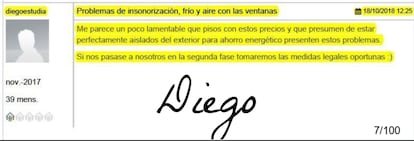How a negative comment about a real estate developer was turned into an NFT
Since being taken to court for criticizing the poor workmanship of his new home, Diego has paid out €4,000 in legal fees. Now he has found an innovative way to recover some of his costs

“For three years, they have put me through hell,” says Diego P., who was accused in 2018 of libel by a real estate company because of an online comment he made about a housing complex in Valdebebas, an urban development under construction near the Spanish capital of Madrid. “At the beginning, I was kind of nervous, but when the judge gave the go-ahead for the trial, I started to be really nervous, because it was a criminal [sentence], prison. And when you see that there is additionally a fine of €50,000 [$53,000], I started asking myself where the hidden camera was,” he explains.
This issue has been hanging over him since the end of 2018, when he wrote a negative comment on an online forum about the finishings of the housing complex he had moved into. In response, the housing developer Valenor filed a case against Diego and the investigating judge approved it for trial. It was later thrown out by the Madrid Provincial Court, and the developer decided not to take it up with the Supreme Court.
“It upsets me a lot that they’re getting away scot-free. Even if they paid my expenses that wouldn’t be enough,” says Diego P., who says the process has already cost him €4,000 ($4,200). Although the case is now closed, Diego asked to maintain his anonymity so that the issue does not harm him in the future.
But the Spaniard now has a new idea about how to raise awareness about his case and get back some of his expenses – turn his original comment into a series of 100 NFTs. A non-fungible token, or NFT, is a non-interchangeable unit of data that can be sold or traded. “It’s super visual, it has an economic impact and it emphasizes the banality of the post. At the heart of it, it’s to get back at them,” says Diego of his NFT.
Diego has posted his series on OpenSea, one of the major NFT sales platforms. It is titled Diego vs. Goliath, and each one costs 0.024 Ethereum, around $70 at the current exchange rate.
Diego, who is a software engineer, has programmed the 100 pieces and generated a specific signature with his name. The NFT is a replica of the November 2017 comment that triggered his legal drama. It reads: “It seems unfortunate to me that apartments with those prices, which they advertise as being perfectly insulated for energy savings, have these problems. If it happens to us in the second phase, we will take the appropriate legal measures :).”

In Spain, it is common for a company to accuse a user or consumer of injury or even libel, which can result in prison sentences. But such cases tend to confront the right to freedom of speech, and they rarely get very far.
Diego’s comment was not even the first in the thread to complain about the development. He was actually responding to a complaint made by another forum user called Lydia. In her 2017 post, she complained: “Aside from the problems of insulation with the cold and acoustics, we also have leaks: in some houses there are leaks in the patios, bathrooms, kitchens.”
Diego’s lawyer observed at the beginning of the case that they could file a complaint against Valenor for making a false accusation, or even against the investigating judge for not having paid enough attention to such a clear-cut case. But both options were dismissed. That’s when Diego opted for the NFTs. “If it had cost them €200,000 [$231,000] in damages or repairs, maybe in the next case they wouldn’t do it again,” he says. “They can do this again without end because it has zero cost. They have their lawyers and all it has cost them is a taxi ride to the Plaza Castilla courts.”
The difference between Diego and the rest of the neighbors who complained on the forum is that he posted an article that called the development “the most techie apartments in Spain.” He believes that Valenor used him as a scapegoat to effectively quash criticism from other neighbors. “They managed to silence people,” he says. “Now they have threatened to denounce the new president of the homeowners association because they say he is acting out of line because he sent a fax to the contractors who did the work because there are items in poor condition.”
The complaints about the development are far from minor. There have been reports of water coming out of electric plugs and spilling out over cars in the parking garage. “It’s like something from a horror movie,” says Diego.
Tu suscripción se está usando en otro dispositivo
¿Quieres añadir otro usuario a tu suscripción?
Si continúas leyendo en este dispositivo, no se podrá leer en el otro.
FlechaTu suscripción se está usando en otro dispositivo y solo puedes acceder a EL PAÍS desde un dispositivo a la vez.
Si quieres compartir tu cuenta, cambia tu suscripción a la modalidad Premium, así podrás añadir otro usuario. Cada uno accederá con su propia cuenta de email, lo que os permitirá personalizar vuestra experiencia en EL PAÍS.
¿Tienes una suscripción de empresa? Accede aquí para contratar más cuentas.
En el caso de no saber quién está usando tu cuenta, te recomendamos cambiar tu contraseña aquí.
Si decides continuar compartiendo tu cuenta, este mensaje se mostrará en tu dispositivo y en el de la otra persona que está usando tu cuenta de forma indefinida, afectando a tu experiencia de lectura. Puedes consultar aquí los términos y condiciones de la suscripción digital.









































